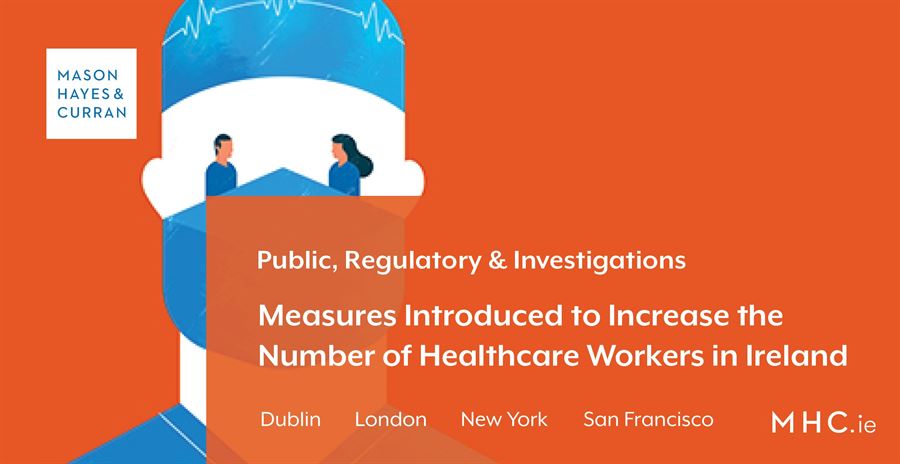COVID-19 - Measures Introduced to Increase the Number of Healthcare Workers in Ireland

A number of steps have been taken in Ireland to increase significantly the number of healthcare workers in light of the COVID-19 pandemic.
The Health Service Executive (HSE) launched the ‘Be on call for Ireland’ recruitment drive on 17 March 2020. The Chief Executive of the HSE, Mr Paul Reid, announced that the health service is looking for qualified healthcare workers including medical, nursing and therapy personnel as well as healthcare assistants as part of the recruitment campaign. The HSE later announced on 10 April that there will be an increase in the annual intake of medical interns this year, from 734 to approximately 1,100. This number would depend on how many students pass their final exams and accept an internship offer.
Steps taken by healthcare regulators in Ireland
The Nursing and Midwifery Board of Ireland (NMBI) and the Irish Medical Council have also taken steps to make it easier for nurses and doctors to return to the register. The NMBI announced on 16 March 2020 that it is waiving the fees normally charged to nurses in order to return to the Irish Register of Nurses and Midwives. The NMBI also issued a further statement on 1 April to invite European and UK general nurses to support the Irish healthcare system during the emergency on a no fee ‘temporary and occasional’ basis if they are currently registered with the regulator in their own country.
The Irish Medical Council announced on 18 March 2020 that it had launched a dedicated pathway for doctors to re-join the register and that doctors re-joining the register for this purpose would have their registration fees waived.
The Emergency Measures in the Public Interest (Covid-19) Act 2020
The Emergency Measures in the Public Interest (Covid-19) Act 2020, enacted on 27 March, introduced key measures to allow health and social care professionals who want to return to work to have their applications to be registered with their regulatory bodies accelerated. The 2020 Act allows, until 31 July 2020, previously-registered health and social care professionals to include doctors, pharmacists, nurses, dentists and other health and social care professionals to be restored to their respective registers without having to pay a fee. The Minister for Health has the power to extend the 31 July 2020 date if required.
Interestingly, the Act also offers some protection to healthcare professionals, other than doctors, who may practise medicine during the pandemic. Normally, it is prohibited for any person, other than a registered medical practitioner, to practise medicine in contravention of the Medical Practitioners Act 2007. However, the 2020 Act provides that healthcare professionals, including nurses, pharmacists, dentists and other health and social care professionals are not practising medicine in breach of the 2007 Act in circumstances where they are acting:
-
Under the direction and control of a registered medical practitioner, or
-
In accordance with directions in writing given by a registered medical practitioner
The 2020 Act provides that this exception applies until 31 July 2020.
Key Takeaways
-
A number of important steps have been taken to increase the number of healthcare workers in Ireland.
-
These steps include:
-
Waiving of registration fees.
-
Legislation to facilitate acceleration of registration.
-
-
These measures are likely to increase significantly the number of healthcare professionals on the register in Ireland, at least temporarily. As a result, there will likely be an increased pressure on the regulators of these professions, both in terms of managing the registration and regulation of the profession and supporting the registrants, particularly at a time when the healthcare service is under considerable strain.
For expert guidance on related COVID-19 matters and how they affect your organisation, contact a member of our Public, Regulatory & Investigations team.
The content of this article is provided for information purposes only and does not constitute legal or other advice.
Share this:




